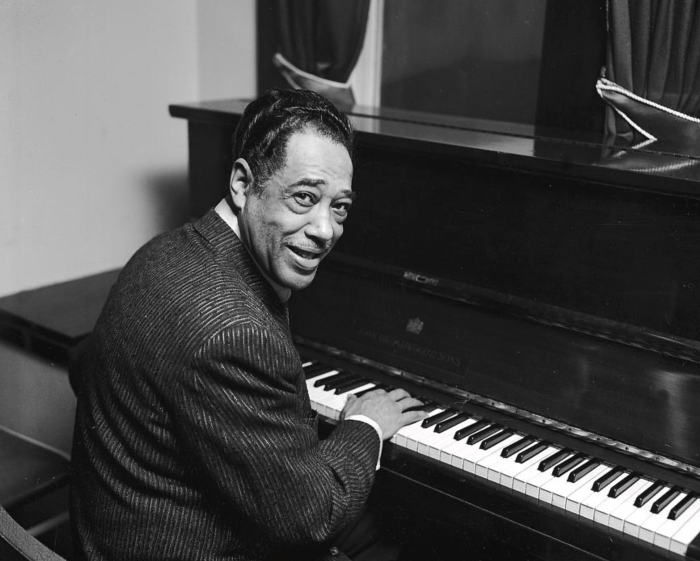Duke Ellington at 125
Edward Kennedy “Duke” Ellington was born 125 years ago today. His 1700 compositions, from three-minute classics to longer integrated works, simple to complex blues and sacred compositions, works for theater and suites, and more, are such a massive achievement that his total contribution to music in the 20th century is nigh impossible for most to fathom.
Ellington joined the ancestors 50 years ago next month, so we’re sharing a previous post on Ellington as a grandmaster leader and rooted cosmopolitan in honor of his musical and cultural legacy.
The Rooted Cosmopolitan
Ellington, the most significant American composer and big band leader of the 20th century, captured in sound the feeling tones, idiomatic nuance, and global range of American life like no other. Rooted in a Black American ethos, Ellington integrated the varying styles of jazz—and the voices and personalities of the specific musicians in his band—into his own grand style and musical conception.
Cosmopolitan means being a widely learned, sophisticated citizen of the world rather than narrowly provincial and insular. Suave and debonair, Ellington was the epitome of urbane refinement. Yet because Ellington had proud, firm roots in his ethnic culture—hear his tone parallel to the history of the American Negro, “Black, Brown and Beige”—he wasn’t unmoored from his origins. Ellington was a rooted cosmopolitan.
His cosmopolitan gifts shine brightly on “The Symphonic Ellington,” “The Nutcracker Suite,” and Grieg’s “Peer Gynt Suite” as well as his take on the music of lands he visited over a half-century of world travels. Compositions such as “The Far East Suite,” “The Latin American Suite,” and “The Afro-Eurasian Eclipse” exemplify his deep listening beyond his own vernacular culture, adapting those international experiences into his own uniquely American idiom.
Ellington’s nephew, Michael James, told me his uncle was a master psychologist. Considering the challenges of holding a band together for 50 years with difficult and, at times, dysfunctional band members, this was undoubtedly true. Ellington was comfortable with people from all places and all walks of life, from hustlers to housekeepers and waiters to the Queen of England. Yet he always kept a reserve, a place of composed solitude. Perhaps this was partly due to the wise advice Michael recalled Duke sharing with him: “Never let someone else’s sickness become your own.”
Grandmaster Leader
As a grandmaster leader, Ellington brought out the best in the musicians in his orchestra. Billy Strayhorn, Duke’s alter-ego in a healthy competition of co-creation, composed classic songs for the band, including their theme song, “Take the ‘A’ Train.” The superb improvisations of band members such as Johnny Hodges, Ray Nance, Juan Tizol, Harry Carney, and Paul Gonsalves were featured on numbers the maestro wrote with their unique sound in mind.
Members of his big band never sounded as good by themselves as they did with him—proof of the extraordinary container of collaborative leadership mastery Ellington designed and achieved for posterity. Duke Ellington, cosmopolite par excellence, wasn’t only a citizen of America and the world; he was a citizen of the cosmos. His genius was truly “beyond category.”
Honoring Ellington at National Artistic Institutions
In its 2023-24 season, the Kennedy Center in Washington has presented 21 programs in Ellington’s honor. A hat tip to the Center’s artistic director for jazz, Jason Moran, for his work honoring the grandmaster in the nation’s capital, Ellington’s birthplace. Jazz at Lincoln Center, from its inception, has presented Ellington’s work not only in hundreds, if not thousands, of concerts, featuring its orchestra, led by Wynton Marsalis, but has distributed 300,000 Ellington music charts to 40,000 high school bands in 57 countries—for free. One million students have been exposed to Duke’s music through JALC’s “Essentially Ellington High School Jazz Band Contest.”
The next Essentially Ellington competition and festival runs from May 9 to 11. I invite you to learn more about this phenomenal success in the annals of American cultural education. Also, consider joining Herbie Hancock and an array of artists across the globe to celebrate International Jazz Day tomorrow, April 30th.



